Each 12-week SEA semester program offers 14-18 semester hour credits through Boston University, SEA’s school of record. The SEA summer sessions offer between 7 and 11 semester hour credits, depending on the program. Below are the course offerings for each SEA program; the course numbers reflect how they are listed in the Boston University course catalog.
Our programs are designed to fit seamlessly into students’ undergraduate coursework as either major, minor, or elective credit.
Earning Program Credit
Credit issued either as direct credit from a student’s home institution (if affiliated with SEA) or as transfer credit from Boston University. Exactly how SEA credit transfers is ultimately up to each student’s home institution. Therefore, it is important that students work with their academic advisor to determine how the credit will best work for them. That being said, SEA enrolls students from a wide variety of colleges and universities each year, and almost all students are able to successfully transfer the full credit.
If you need assistance with the credit transfer process, contact your SEA Admission Counselor with questions. We are often able to direct students to faculty or alumni on their home campus for specific guidance.
Caribbean Reef Expedition (18 credits)
Prereq: Admission to SEA Semester. Sophomore standing or consent of instructor.
Be an effective leader while leveraging the individual strengths of a team. Use leadership theory and case studies to understand how decisions affect outcomes. Participate as an active member of a ship’s crew, progressively assuming full leadership roles.
Prereq: Admission to SEA Semester. Sophomore standing or consent of instructor.
Employ methods and sources of historians and social scientists. Examine the role of human societies in coastal and open ocean environmental change. Issues include resource conservation, overfishing, pollution, invasive species, and climate change.
Prereq: Admission to SEA Semester. Sophomore standing or consent of instructor.
Culture, history, political systems and science can shape ocean policy. Practice current strategies to build, analyze, and communicate about diverse policy issues. Examine the power, use and limitations of science and the scientist’s voice in determining ocean policy.
Prereq: Admission to SEA Semester. Sophomore standing or consent of instructor.
Ocean ecosystem change in the anthropocene: warming, acidification, fisheries depletion, and pollution. Review principles of circulation, seawater chemistry, nutrient dynamics, and biological production to understand causes and consequences of change. Conduct field measurements for contribution to time-series datasets.
Directed Oceanographic Research (300-level, 4 credits)
Prereq: Admission to SEA Semester. Three lab science courses (one at the 300-level or higher) or consent of instructor.
Design and conduct original oceanographic research. Collect data and analyze samples. Compile results in peer-reviewed manuscript format and share during oral or poster presentation session. Emphasis on development of research skills and written/oral communication abilities.
Practical Oceanographic Research (200-level, 4 credits)
(Previously titled Practical Oceanography II)
Prereq: Admission to SEA Semester.
Introduction to oceanographic research. Design a collaborative, hypothesis-driven project following the scientific process. Collect original data. Conduct analysis and interpretation, then prepare a written report and oral presentation.
Climate & Society (18 credits)
Prereq: Admission to SEA Semester. Sophomore standing or consent of instructor.
Be an effective leader while leveraging the individual strengths of a team. Use leadership theory and case studies to understand how decisions affect outcomes. Participate as an active member of a ship’s crew, progressively assuming full leadership roles.
Ocean ecosystem change in the anthropocene: warming, acidification, fisheries depletion, and pollution. Review principles of circulation, seawater chemistry, nutrient dynamics, and biological production to understand causes and consequences of change. Conduct field measurements for contribution to time-series datasets.
Seminar focusing on communication skills development for environmental scholars. Introduces the field of environmental communication, examines environmental attitudes and behaviors, and develops a toolkit of communications strategies. Includes projects in data visualization, multi-media presentation and digital storytelling.
Prereq: Admission to SEA Semester. Sophomore standing or consent of instructor.
Culture, history, political systems and science can shape ocean policy. Practice current strategies to build, analyze, and communicate about diverse policy issues. Examine the power, use and limitations of science and the scientist’s voice in determining ocean policy.
Advanced humanities and social science seminar focusing on contemporary climate-related issues including urban/coastal resilience, poverty and justice, clean energy, human displacement, and national security. Emphasizes case study analysis and research methods. Requires field data collection, research paper and symposium presentation.
Directed Research Topics (300-level, 4 credits.)
Prereq: Admission to SEA Semester. Sophomore standing or consent of instructor.
Seminar exploring humanities and social sciences approaches to understanding and resolving contemporary climate-related issues. Development of research and writing skills through analyses of case studies and guided seminar exercises. Requires field data collection, research paper and presentation of results.
Caribbean Communities and Conservation (17 credits)
Prereq: Admission to SEA Semester. Sophomore standing or consent of instructor.
Be an effective leader while leveraging the individual strengths of a team. Use leadership theory and case studies to understand how decisions affect outcomes. Participate as an active member of a ship’s crew, progressively assuming full leadership roles.
Prereq: Admission to SEA Semester. Sophomore standing or consent of instructor.
Employ methods and sources of historians and social scientists. Examine the role of human societies in coastal and open ocean environmental change. Issues include resource conservation, overfishing, pollution, invasive species, and climate change.
Prereq: Admission to SEA Semester. Sophomore standing or consent of instructor.
Culture, history, political systems and science can shape ocean policy. Practice current strategies to build, analyze, and communicate about diverse policy issues. Examine the power, use and limitations of science and the scientist’s voice in determining ocean policy.
Prereq: Admission to SEA Semester. Sophomore standing or consent of instructor.
Ocean ecosystem change in the anthropocene: warming, acidification, fisheries depletion, and pollution. Review principles of circulation, seawater chemistry, nutrient dynamics, and biological production to understand causes and consequences of change. Conduct field measurements for contribution to time-series datasets.
Directed Oceanographic Research (300-level, 4 credits)
Prereq: Admission to SEA Semester. Three lab science courses (one at the 300-level or higher) or consent of instructor.
Design and conduct original oceanographic research. Collect data and analyze samples. Compile results in peer-reviewed manuscript format and share during oral or poster presentation session. Emphasis on development of research skills and written/oral communication abilities.
Practical Oceanographic Research (200-level, 4 credits)
(Previously titled Practical Oceanography II)
Prereq: Admission to SEA Semester.
Introduction to oceanographic research. Design a collaborative, hypothesis-driven project following the scientific process. Collect original data. Conduct analysis and interpretation, then prepare a written report and oral presentation.
Marine Biodiversity & Conservation (18 credits)
In-depth treatment of a single topic in biological oceanography. Extensive review of classical and contemporary literature. Introduction and practice of current laboratory techniques. Oral presentation and written research proposal required. Topics may include marine plankton ecology, marine biodiversity, and satellite oceanography.
Culture, history, political systems and science can shape ocean policy. Practice current strategies to build, analyze, and communicate about diverse policy issues. Examine the power, use and limitations of science and the scientist’s voice in determining ocean policy.
Learn the fundamentals of sailing ship operation, in preparation for direct application at sea. Navigation (piloting, celestial and electronic), weather, engineering systems, safety, and sail theory. Participate as an active member of the ship’s crew on an offshore voyage.
Advanced policy research focusing on a topic of current importance (may include fisheries, biodiversity, marine spatial planning, and cultural heritage). Emphasis on theoretical concepts, research methods, and communication skills. Requires critical review paper, original research, final report and presentation.
Design and conduct original oceanographic research. Collect data and analyze samples. Compile results in peer-reviewed manuscript format and share during oral or poster presentation session. Emphasis on development of research skills and written/oral communication abilities.
Oceans & Climate (18 credits)
Prereq: Admission to SEA Semester. Sophomore standing or consent of instructor.
Ocean as carbon source and sink. Examine global-‐scale flux patterns and carbon storage mechanisms, from solubility/biological pumps to geo-engineering. Explore buffering capacity and mitigation strategies in the face of anthropogenic carbon cycle perturbations. Oral presentation and written research proposal required. Syllabus Oceans-in-the-Global-Carbon-Cycle
Prereq: Admission to SEA Semester. Junior standing or consent of instructor.
Seminar focusing on communication skills development for environmental scholars. Introduces the field of environmental communication, examines environmental attitudes and behaviors, and develops a toolkit of communications strategies. Includes projects in data visualization, multi-media presentation and digital storytelling.
Learn the fundamentals of sailing ship operation, in preparation for direct application at sea. Navigation (piloting, celestial and electronic), weather, engineering systems, safety, and sail theory. Participate as an active member of the ship’s crew on an offshore voyage.
Tools and techniques of the oceanographer. Participate in shipboard laboratory operations to gain experience with deployment of modern oceanographic equipment and collection of scientific data at sea. Emphasis on sampling plan design, advanced laboratory sample processing methods, and robust data analysis.
Design and conduct original oceanographic research. Collect data and analyze samples. Compile results in peer-reviewed manuscript format and share during oral or poster presentation session. Emphasis on development of research skills and written/oral communication abilities.
Ocean Exploration (17 credits)
To understand environmental justice from an ocean perspective, it is essential to explore the relationship between humans and the sea. History, literature, and art are all components of maritime heritage and can inform a broader understanding of the context for contemporary marine policies. Maritime workers frequently acted as agents of change, sometimes leading to drastic cultural, economic, and social disruption. This humanities course will help inform your own seagoing experiences and gprovide insightinto how maritime workers shaped societies worldwide.
Learn the fundamentals of navigation, safety, weather, sailing theory, and engineering to ensure that you become a functioning member of the shipboard community There are no passengers on SEA’s vessels, and Nautical Science will prepare you to be an active crewmember.
To understand contemporary ocean issues, it is critical to understand the chemical, physical, geological and biological processes in the ocean environment. Bathymetry, plate tectonics, and biological productivity all play roles in the larger planetary system in which we all reside.
Prereq: Admission to SEA Semester.
Learn about the most current oceanographic equipment, techniques, and methodology to become an active member of the shipboard science community. This course trains you in the hard skills necessary to fully understand the ocean environment and better understand the interdisciplinary nature of the sea.
Syllabus
Prereq: Admission to SEA Semester.
Design a collaborative scientific project or experiment driven by your intellectual curiosity. Working as a team, create a hypothesis, collect data, analyze results, and present your findings about your project to the shipboard community.
Sustainability in Pacific Island Communities and Ecosystems (17 credits)
Prereq: Admission to SEA Semester. Sophomore standing or consent of instructor.
Field-intensive analysis and documentation of dynamic relationships between nature and culture in specific coastal, island, and ocean places. Apply cultural landscape and related interdisciplinary bio-cultural approaches to place-based environmental studies.
Prereq: Admission to SEA Semester. Sophomore standing or consent of instructor.
Employ methods and sources of historians and social scientists. Examine the role of human societies in coastal and open ocean environmental change. Issues include resource conservation, overfishing, pollution, invasive species, and climate change.
Prereq: Admission to SEA Semester.
Learn the fundamentals of sailing ship operation, in preparation for direct application at sea. Navigation (piloting, celestial and electronic), weather, engineering systems, safety, and sail theory. Participate as an active member of the ship’s crew on an offshore voyage.
Ocean ecosystem change in the anthropocene: warming, acidification, fisheries depletion, and pollution. Review principles of circulation, seawater chemistry, nutrient dynamics, and biological production to understand causes and consequences of change. Conduct field measurements for contribution to time-series datasets.
Directed Research Topics (300-level, 4 credits.)
Prereq: Admission to SEA Semester. Sophomore standing or consent of instructor.
Seminar exploring humanities and social sciences approaches to understanding and resolving contemporary climate-related issues. Development of research and writing skills through analyses of case studies and guided seminar exercises. Requires field data collection, research paper and presentation of results.
The Global Ocean (14-18 credits)
Prereq: Admission to SEA Semester. Sophomore standing or consent of instructor.
Explore impacts of European maritime ventures on the societies they contacted in the Atlantic or Pacific, with focus on the resulting social, political, economic, and cultural changes. Investigate responses documented in the post-Colonial literature of indigenous people.
Prereq: Admission to SEA Semester. Sophomore standing or consent of instructor.
Ocean ecosystem change in the anthropocene: warming, acidification, fisheries depletion, and pollution. Review principles of circulation, seawater chemistry, nutrient dynamics, and biological production to understand causes and consequences of change. Conduct field measurements for contribution to time-series datasets.
Prereq: Admission to SEA Semester. Sophomore standing or consent of instructor.
Be an effective leader while leveraging the individual strengths of a team. Use leadership theory and case studies to understand how decisions affect outcomes. Participate as an active member of a ship’s crew, progressively assuming full leadership roles.
Prereq: Admission to SEA Semester. Sophomore standing or consent of instructor.
Comparative and issue-driven introduction to managing human uses and conserving coastal and ocean places and resources. Explore concepts of technology, governance, sector and ecosystem management, and marine protected areas through expert content lectures, topical seminars, and field trips.
Prereq: Admission to SEA Semester. Sophomore standing or consent of instructor.
Field-intensive analysis and documentation of dynamic relationships between nature and culture in specific coastal, island, and ocean places. Apply cultural landscape and related interdisciplinary bio-cultural approaches to place-based environmental studies.
Directed Oceanographic Research (300-level, 4 credits)
Prereq: Admission to SEA Semester. Three lab science courses (one at the 300-level or higher) or consent of instructor.
Design and conduct original oceanographic research. Collect data and analyze samples. Compile results in peer-reviewed manuscript format and share during oral or poster presentation session. Emphasis on development of research skills and written/oral communication abilities.
Practical Oceanographic Research (200-level, 4 credits)
(Previously titled Practical Oceanography II)
Prereq: Admission to SEA Semester.
Introduction to oceanographic research. Design a collaborative, hypothesis-driven project following the scientific process. Collect original data. Conduct analysis and interpretation, then prepare a written report and oral presentation.
Pacific Reef Expedition (7 credits)
Prereq: Admission to SEA Semester.
Learn the fundamentals of sailing ship operation, in preparation for direct application at sea. Navigation (piloting, celestial and electronic), weather, engineering systems, safety, and sail theory. Participate as an active member of the ship’s crew on an offshore voyage.
(Previously titled Practical Oceanography II)
Prereq: Admission to SEA Semester.
Introduction to oceanographic research. Design a collaborative, hypothesis-driven project following the scientific process. Collect original data. Conduct analysis and interpretation, then prepare a written report and oral presentation.
Protecting the Phoenix Islands (11 credits)
Prereq: Admission to SEA Semester. Sophomore standing or consent of instructor.
Ocean ecosystem change in the anthropocene: warming, acidification, fisheries depletion, and pollution. Review principles of circulation, seawater chemistry, nutrient dynamics, and biological production to understand causes and consequences of change. Conduct field measurements for contribution to time-series datasets.
Prereq: Admission to SEA Semester. Sophomore standing or consent of instructor.
Comparative and issue-driven introduction to managing human uses and conserving coastal and ocean places and resources. Explore concepts of technology, governance, sector and ecosystem management, and marine protected areas through expert content lectures, topical seminars, and field trips.
CHOICE OF:
Design and conduct original oceanographic research. Collect data and analyze samples. Compile results in peer-reviewed manuscript format and share during oral or poster presentation session. Emphasis on development of research skills and written/oral communication abilities.
(Previously titled Practical Oceanography II)
Prereq: Admission to SEA Semester.
Introduction to oceanographic research. Design a collaborative, hypothesis-driven project following the scientific process. Collect original data. Conduct analysis and interpretation, then prepare a written report and oral presentation.



